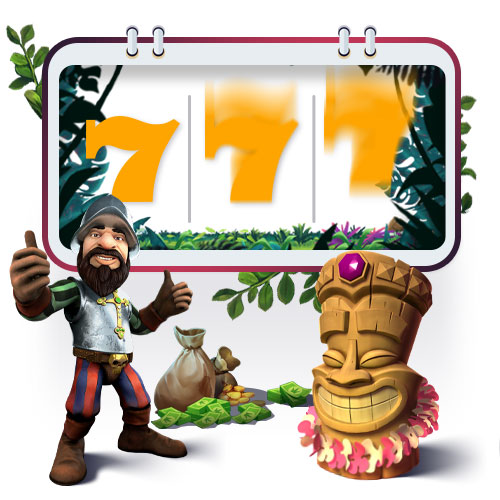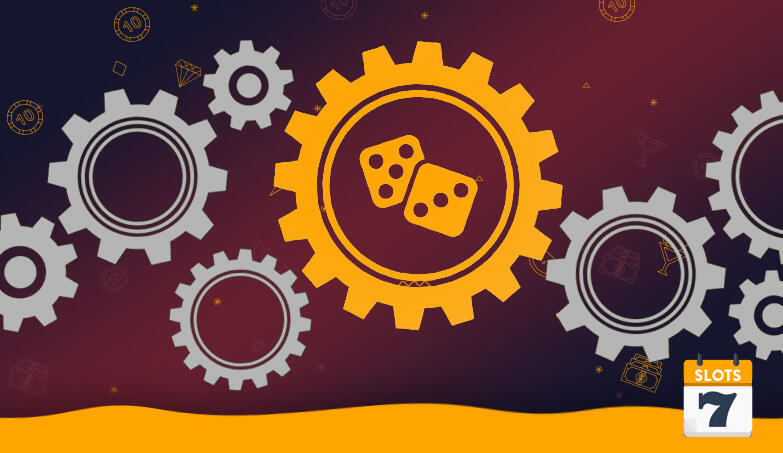How do casino slot machines work? Is it science or magic that makes these fun machines act the way they do? Modern slot machines are the most popular casino games of them all and even if their basic rules of functioning haven’t changed since 1899 when Charles Fay invented the first one, players still don’t understand their mechanics.
So a slot player enters a land-based casino, chooses a machine, makes a bet, and pushes a button (or pulls a lever) to spin the reels on slots. Each reel stops at a random position. If the reels stop in a way that forms a line (payline) of the same symbols, the player wins.
The more complicated a combination is and the rarer the symbols, the higher the amount won will be. Each winning combination and its payout is listed in the paytable.
While in the past the randomness was mostly mechanical, now we have numbers generated by a computer, but the basic principles are the same. Each trusted and licensed game provider abides by the laws of randomness. But let’s find out exactly “how do random number generators work in slot machines” and every other thing you should know about the workings of slots.
How Do Slots Work?
Online and offline slots both still use the reels to show you what’s going on. A computer renders these reels but inside the machine are roughly the same numbers of sets of symbols and a lot of game math. The wilds, scatters, free spins and all other bonus rounds that you are used to by now in modern slots wouldn’t have been possible without using a computer as mechanical reels couldn’t use them.
The outcome of every spin you make on a slot machine is determined by the Random Number Generator (RNG). This RNG will cause the reels to stop and so it will determine the outcome of your spin, whether you win or lose.
The RNG generates a random number, and because of all the math behind it, the computer will calculate where the reels will stop based on that number/position. The result is then displayed.
The outcome of a spin isn’t influenced by anything you or other players do or have done, and it cannot be predicted. It doesn’t matter if you’ve won 10 times in a row, you can’t guarantee that the next spin will be neither a win nor a loss. It’s all just gambling luck. If luck is on your side, then the RNG will pick a random number that helps you get a winning combination.
Still unclear on how the RNG works? It’s a hardware device which generates random numbers out of electromagnetic noise. Picture an old TV with no signal, that’s how it looks like, only instead of white and black pixels you have 0s and 1s. If you were to pick a random place on the screen and write the numbers down, you would have a random number.
While you can only choose a couple of random sports, the RNG can generate thousands of numbers every single second. Consequently, if you press the play button a second sooner or later, you change the possible outcome of the spin, but you have no way of knowing if you created a better or worse outcome.
It’s the same with bonus features; you can’t predict when they trigger or even if they trigger, you can just pick a game that has them and hope for the best. This also applies to winning with thousands of Megaways and any other extra perks. You will have better chances, true, but nothing is guaranteed.
Are Casinos Rigged?
Licensed casinos can’t be rigged, but if you’re wondering how can casinos make money this way if everything is random so they don’t know whether someone can continuously win until they bankrupt them, the answer is simple. Slot machine games are designed in such a way that, in the long run, the payouts are less than what the players bet.
Basically, it’s all about the house edge. All casino games have a house edge that guarantees that while players can win, the casino will make a profit.
To break down the math behind slot machine games, there are several things that need to be taken into account: the number of symbols, the payouts available, the rules and even the probabilities of bonus features. All these things, as well as the RNG, are what lead to the long-term advantage of casinos over players.
When you play a slot game, it’s not the casino that has power over that game so there is no way it can rig the game in its favour. The game you play comes directly from the servers of the game providers who are rigorously and continuously tested for randomness.
So you choose your game, and the casino will initiate the gaming session. The game will then connect to the game software provider’s server, not the casino’s. The casino just confirms the bet and communicates it to the provider, which then uses the RNG and transmits the result back to the casino, which will then decrease/increase your balance, all in just a fraction of a second.
Consequently, the game will always be fair, and if you lose, it’s not because of the casino, it’s because of bad luck. That’s not to say that casinos can’t be rogue because they can, but that will only affect your chances of withdrawing your winnings or dealing with predatory terms and conditions.
Obviously, the best practice and the most responsible thing you can do is to do your research and pick only trusted and licensed casinos so that you don’t have any issues at all.
How Do Casinos Make a Profit?
To better understand this, you need to see that casinos and players think of prices in different terms. For a casino operator, it’s the expected house advantage of each bet placed by players which is built into the game long-term. At the same time, players (as individuals) only have limited interaction with a particular game which will make them see the price completely different.
Let’s take an example to acknowledge this difference better. Assume a 5% house edge. Over time, the game will return 5% of all wagers to the casino. Thus a million in wagers over a million spins would be expected to pay out £950,000 and get the casino a profit of £50,000.
So for the casino, the price is that 5% they will collect in time from the players.
For a player, things will be completely different as they will probably think of the price as the cost of their spin. So when you make a £1 spin and win nothing, you will think of that £1 as the price, not the 0.05.
None of these ways of thinking is wrong because while the casino has indeed gotten £1 from this player, they will eventually give back 95 cents to players (maybe not to you, but to players as a whole).
If you’re playing a slot game for just a couple of minutes or even for an hour or two, there’s no wat for you to see the long-term picture because you would need years of playing the same game over and over again.
So the gap between what the player sees and what the casino sees is that players have their own (time) limited experience, while the casino sees the whole picture over a considerable period.
When you go to a casino and have £100 to bet on your favourite slot game, three things can happen. You can either lose the whole sum, hit a considerable jackpot and walk away a winner or lose some, win some and stop on the medium ground.
You need to keep in mind that for jackpots to be the incredible size they are, it’s required that some players lose their whole budget. You need big losers to have big winners.
So you see, that it’s hard for players to understand how the casino makes its profit and what the house edge is because it’s pretty rare to lose your £100 in 5% increments per spin, there’s no uniformity. You can win £30 on a spin, lose £1 for the next ten, then win another £50 but end up losing it all or even winning everything back and then some on the last spin.
Then again, if it were linear, it would be quite dull, and the only reason players enjoy slots is that they are unpredictable and exciting.
RTP, Volatility & How They Affect Your Chances of Winning
One thing that you certainly need to understand no matter what casino game you’re interested in is that all casino games have a house edge and whether you think about it or not it will affect your odds of winning.
Understanding the house edge is crucial because if you pick slots that have a significant house edge, you are minimising your winning chances from the get-go. Furthermore, you must understand that when the house edge goes up, the RTP goes down (return to player).
The RTP (and consequently the house edge) and the volatility are two vital characteristics of the game which will influence how often and even how much you can win.
What Is the RTP?
The RTP (return to player) is often regarded as the percentage of your wager that you can expect to get back in the form of wins. But it’s more a long-term statistical rate in which the total money won on the game is divided by the total money which was bet on it.
The reason why it’s a little hard to understand the RTP is that it’s not based on what you do and it’s not something that 100% of the time is going to be the same way for everyone.
Let’s take an example to try to clarify it. Assume you find an average slot machine with a 96% RTP. If you make 100 £1 bets on it, theoretically you should, on average, get back £96. The 4% is the house edge which will bring the casino profit in time.
But what you need to understand is that this percentage is purely theoretical as no one will get exactly this. It takes millions of spins to get to this value because everything is long-term, not short term.
In the short term, the same way you can lose your full £100, you can also win £50 back, double your money or even hit the combinations of symbols that lead to a jackpot.
As we were saying before, 96% is a pretty average RTP, but you can find slots either downwards or upwards of that value. Online free slots even offer the option to test 98% or more slots in demo mode to see what your possibilities are. But you should keep in mind that in brick and mortar casinos most likely than not you will find slot machines with a lower RTP than online.
Luckily the most trusted casino sites list their RTPs so that you can form an idea on what you can safely play. You should always make sure that you’re playing slots with a high RTP or at least an average one and don’t go below 94%.
What Is Volatility?
Volatility is yet another concept related to slots and other casino games which at first can seem pretty complicated. As opposed to the RTP, the volatility can’t be expressed as a number because you can win many different amounts because of the various winning combinations. That’s why software providers will categorise slots as low, medium or high volatility. While it is quite general and you can’t use these terms to calculate any sure thing, they will give you an idea about what you are about to play.
Even so, the principle is easy to figure out. High volatility slots will theoretically bring you bigger seldom wins while low volatility will bring you frequent small wins and the medium volatility is somewhere right down the middle.
In order to figure out the volatility of a slot machine, you need to look at the reel set and the paytable and estimate probabilities. Some players enjoy high volatility games because they can win more and there is a lot more excitement involved even when making small bets and the smaller bets will lead to losing less so in a way it compensates for the lower RTP.
Others prefer low volatility titles because even though you might not win huge sums, risks are lower, you will get a winning combination quite often, and the RTP will generally be higher.
The interesting thing is that sometimes high volatility casino games are preferred even though their RTP is smaller than that of others. For example on some table games, blackjack has a really high RTP that sometimes is even 99% and lotteries have an RTP of around 50%. Still, the multimillion wins you can potentially get while playing lottery seem to be enough to persuade players to choose it over blackjack.
Apart from the lottery, slots are the most volatile casino games. And that’s probably one of the reasons why they are so appealing.
If high volatility slots are your jam, then you should use the gamble feature which doesn’t affect the RTP, but it will raise the volatility and get you bigger possible wins. You can also lower the number of paylines you use and bet more per line for the same result.
If you prefer being on the safer side of things and going with small wins often, then you should stick to low volatility slots. And also use the 10 secret tips for winning at slots if you want the best possible chances of success.
Common Slot Machine Myths Debunked
There are a lot of myths about slot machines, and most of them don’t even make sense. You’ve probably heard at least once about some of them and had different shady websites telling how you can cheat the system and make slots payout each time you play them by using some sort of magnets or playing the “hot” slots and avoiding “cold” ones.
Newsflash: there is no such thing. Remember the Random Number Generator? The RNG makes everything random so there is just no way to say that a slot game is hot or cold because there’s no telling when you’ll win.
Just because it hasn’t paid out in a long time, it doesn’t mean that it’s “due”. There’s no way to predict anything. You either get lucky, or you don’t.
Also, you can’t use magnets to mess with the RNG. Obviously, slot machine makers have thought of everything and made sure that no one can cheat the machines.
Some say that slots are programmed not to give a big payout after another and to pay more when they are full of money. Not a thing also. The myth probably originates in the old days when standalone slots in bars paid players directly. But it wasn’t true then, and it’s isn’t true now because you can get the rest of the win from the casino staff.
Again, everything is random, so it’s entirely possible to win big two spins in a row.
Furthermore, using the autoplay feature will not pay less than if you clicked the spin button manually. There is literally no difference. If you set the same bet, it won’t make a difference. Also, quickly hitting stop after you press play will not guarantee that you get a better combination.
Since it’s random, it could either help you or not; there’s no way of knowing that if you would’ve left it alone, you wouldn’t have gotten an even better result.
How to Win at Slot Machines
While there is no sure-fire way to do this, there are several things you can try to help improve your chances. Remember that you can’t alter the RTP, the house edge or the RNG, but what you can do is be smart about playing.
Here are the DOs and DONTs of playing slot machines.
- Don’t be reckless and bet more than you can afford.
- Don’t believe in unfounded myths.
- Don’t play games with a huge house edge.
- Don’t play at shady casinos.
- Don’t chase your losses.
And the DOs:
- Practice responsible gambling.
- Make a budget and stick to it.
- Know all the rules and inner-workings of the game before playing it.
- Research everything.
- Choose trusted, legal and licensed casinos.
- Play for fun, not for profit.
- When it stops being fun, take a break.
By playing responsibly and making good choices, even when you’re out of luck, you can minimise your losses and be able to come back stronger another time and try again. This way, no matter what happens, you are still having fun, never end up regretting the funds you’ve spent or having any sort of issues.
You will make better choices when it comes to casinos and games so that when you look back over an extended period, you can see that you’ve come out on top, rather than in a deficit.
Also, remember that playing online will actually improve your chances as compared to playing at brick and mortar casinos because since there are fewer costs for the online casinos you get better RTP and perks like tailored bonuses and more. What is more, online you can also practice playing both new and popular slots and other casino games so that you know what to expect from all of them.
So think about all the things we’ve discussed today and make sure you apply your knowledge when you’re gambling!

 Free Slots
Free Slots








